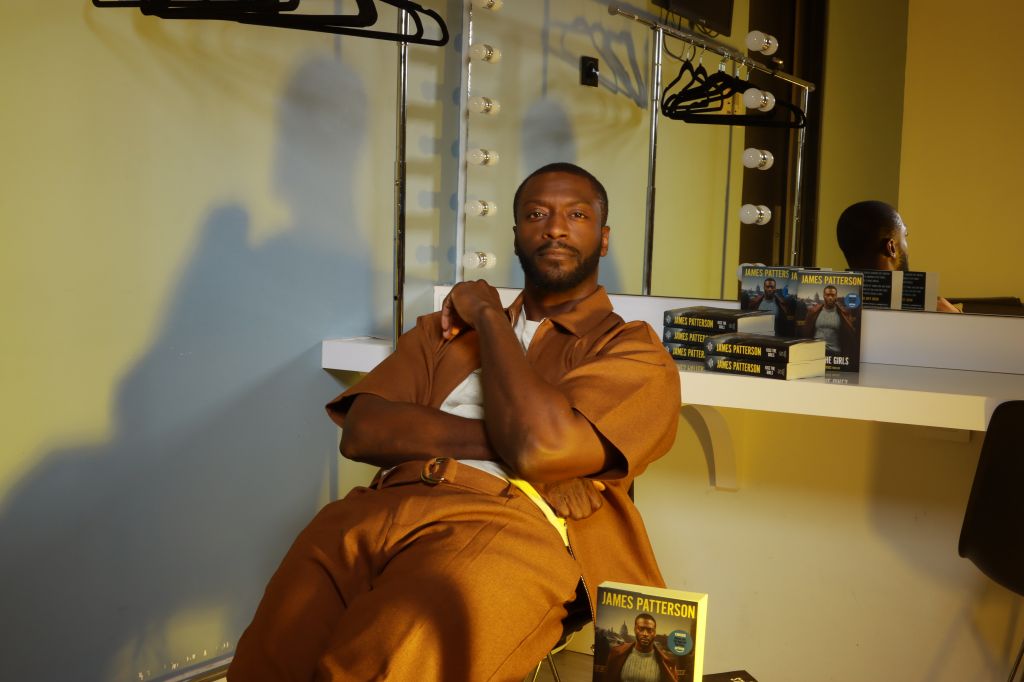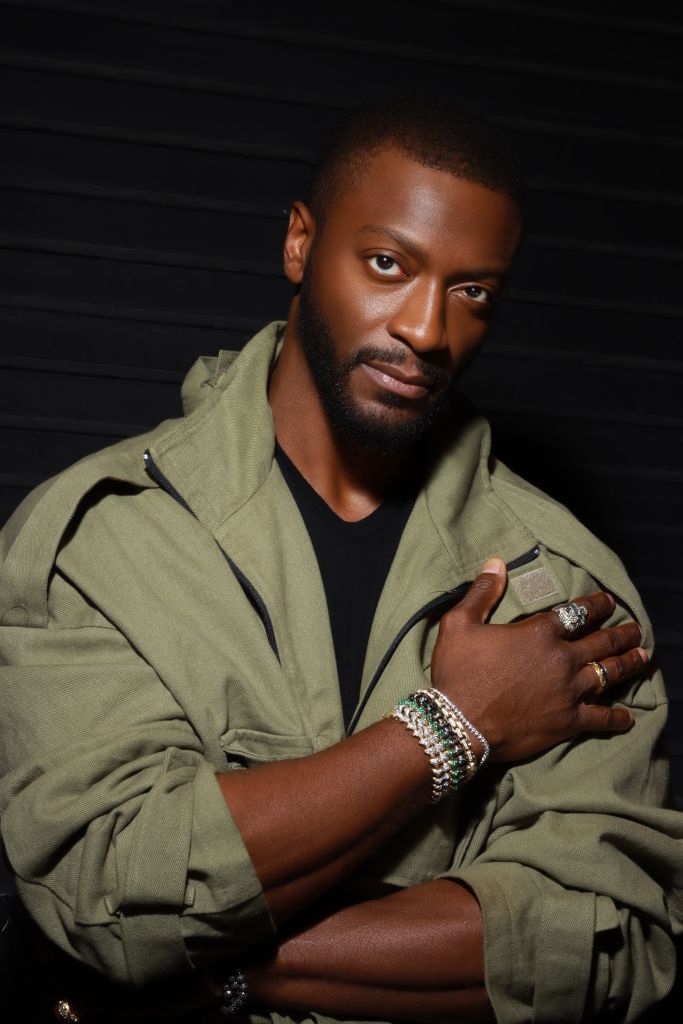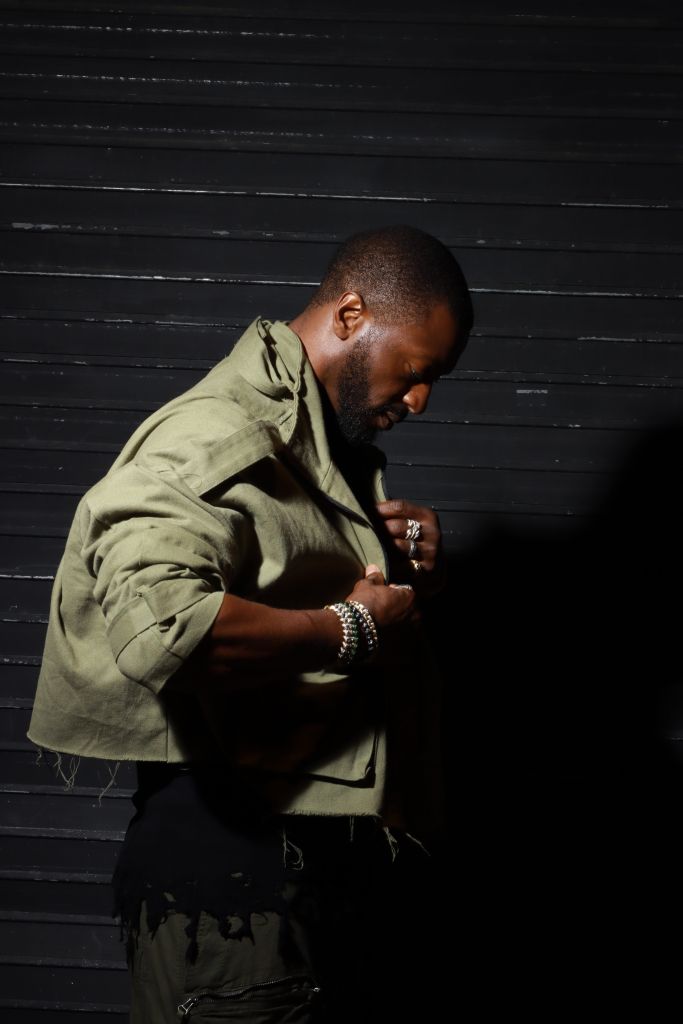Aldis Hodge Says 'It's About Damn Time' He's A Leading Man
‘Cross’ Exclusive: It’s About Damn Time Aldis Hodge Is A Leading Man

Source: Sailey Williams / Sailey Williams
Regarding patience and time, Aldis Hodge knows all about it too well. The horology enthusiast has long captivated fans with his roles in television and film, leaving them wondering why he hasn’t had any leading roles. Well, finally, Hodge is front and center in the new Prime Video series Cross, and it’s about damn time.
In the series, Aldis Hodge brings his on-screen “big d-ck energy”—which is displayed in the first episode’s opening minutes— and swagger to a role that has also been portrayed by other Hollywood big names like Morgan Freeman and Tyler Perry, delivering a fresh take on the character who is the sole focus of author James Patterson’s novels.
In the eight-episode series, which is already getting a second season, Aldis Hodge’s Cross is a Washington, D.C., homicide detective and forensic psychologist, devoted father, and family man. He is contemplating a leave of absence due to his drive and obsession with getting in the minds of killers and their victims. Still, one last high-profile case, the mysterious murder of a defund the police and Black Lives Matter activist, puts the idea of handing in his badge on hold.
Teaming up with his partner, John Sampson (Isaiah Mustafa), Cross finds out that he’s dealing with someone who knows him very well and is also in his head, forcing him to face his issues, specifically the trauma of his wife being viciously gunned down while letting his career keep him away from his family.
CASSIUSLife’s own Bernard “Beanz” Smalls virtually sat down with the actor, who is also an executive producer on Cross, to discuss his first leading role and how this show isn’t just your typical cop show from the mind of series showrunner Ben Watkins.
CASSIUSLife: Your fans, the ladies, including us, have been screaming that you exude leading man energy because you command the screen whenever you get in front of the camera. Now that you are the leading man in Cross, does it feel different? Did you approach this role differently in any way? And also, did you say it’s about damn time when this all came together for you?
Aldis Hodge: Definitely said it’s about damn time. But I guess in terms of the “leading man energy,” I don’t see it so much from the perspective of entertainment. I see it from the perspective of entrepreneurship and business. I’m an executive producer on the show, so I got to lead the team. Ben Watkins, who is the showrunner and show creator, is a fantastic teacher. When we first met and talked about this job, I said, “All right, man, you are going to be my next teacher.” Because I like to surround myself with professors who can help me evolve and teach me how to be better, and Ben is absolutely that.
So, for me, the idea of a leading man is where am I leading my business? What have I been building my entire life toward? What purpose does Cross really serve in that equation? And what purpose do I serve to the greater goal of what Cross is meant to be and what we’re supposed to be here for? So yeah, I don’t really think about the entertainment factor of it all. I think about the realized importance of taking care of people’s jobs, getting people home happy, making sure we’re building something that lasts and making sure that we are taking care of people in a way where they feel valued and seen.

Source: Sailey Williams / Sailey Williams
Amen to building something that lasts because these shows come and go, man. We need these shows to last. We get emotionally invested, and the next thing you know, it’s done.
Exactly. You like, “Come on, fam.” Well, at least Amazon understands that with y’all because they like, “Look, we gone give y’all two seasons straight up.”
Exactly. Exactly. Now, one thing I found very interesting about this show is that it reflects some societal issues affecting Black Americans and people of color, like Black Lives Matter, George Floyd, and defunding the police. Why was it essential for Cross to establish that so early, literally in the first episode? Why was it so essential that it be established quickly?
That was intentioned or attentional rather from Ben Watkins. But for me, it just is what it is in nature. This is what we actually go through. I think there’s a lot of contention around the conversation because, a lot of times, people conflate one thing with the other because they don’t live the experience. They’re not on the receiving end of the consequences, so they don’t really understand what we talk about when we say our lives are a bit deprivative when it comes to relation to this. Some people think we’re just complaining. There’s a difference between complaining and explaining.
Some people think we’re just complaining. There’s a difference between complaining and explaining.
So, in order to be true to the nature of what this is, and bring it and make it current today, we had to be honest. You want a cop show about a cop who happens to be a Black man that’s about his community, you have to be honest. What comes along with that are these things. I think there is no decisive factor that makes us choose the subject matter. We have decided to tell the story. This is a part of the story. And like Ben says, if we’re not being honest on the page, we’re not being honest to the audience, and they’re going to know that. So, for me, there is no decision. It’s just the moment we decided to tell the story about Cross who he is and be honest about it, all these things naturally come with it because this is our natural life as Black culture, Black community in this country. It’s what we go through, and there is no choice but to be honest about it.

Source: Sailey Williams / Sailey Williams
Yeah. I love to hear that. Now, what do you say to those who use television and film to escape what’s going on in reality and those who feel like they don’t want these issues in their shows or don’t want to see them on the television screen? It’s bad enough to deal with it in real life. What do you say to those people?
Again, there’s a reason some people might not want to approach those subjects: oftentimes they’re looking for a solution. Sometimes, there is no immediate solution, but sometimes, there is reasoning, and sometimes, there is understanding. And a lot of times, I feel like people are fatigued because they have been misunderstood for so long. The thing I love about Ben’s approach to the subject matter here is that we offer a means of we’re not giving people a solution. We’re giving people the understanding of the conversation. Why do we even have the conversation? We’re giving you an understanding of what this environment actually is so that we can invite you into the conversation. And then now you are educated or at least have a nuanced perspective where you yourself can be additive. You can add something to the conversation. I find myself not being bogged down by the approach to the subject matter because it’s clarified, it’s refreshing. It’s something I’ve been looking for for quite some time.
Sometimes, there is no immediate solution, but sometimes, there is reasoning, and sometimes, there is understanding.
A lot of people approach the subject, but they don’t know how to navigate you through the subject. And Ben and the writers, I think, have done so beautifully, and it’s entertaining, but it’s also real. It’s honest, it’s earnest. And then you have a character that’s not us being submissive about these things, dodging and ducking. You have characters that are going straight at the issue. And I think that’s the frustration. A lot of times, when people talk about these subjects on TV, you have characters that aren’t honest or true. That’s more frustrating to deal with than the subject matter. It’s like, bro, that’s not how you would even go at that. That’s not even what you would say. And it’s like, now, we have perspectives that speak true to what people want to say and how they want to react and how they actually do react. When you get that means of connectivity, you have a whole different experience, and you can own that experience in a different way.
Absolutely. Absolutely. Now, another issue that hit me when you touched on it is the mental health aspect and how Cross deals with his grief. I, too, am still dealing with grief. I lost my mother about a year and a half ago, and it still hits hard every day.
Sorry to hear that, bro.
Back again to being honest about it. Here’s a man who has to be so much to everybody around him. Sometimes he doesn’t have time for himself, he doesn’t have time to address himself. Thank God he has a friend like John Sampson who keeps pushing him to be like, “Bruh, you need to go get some help.” I love the fact that we address mental health because, just worldwide and then, more specifically, how it is treated within the Black community, often people regard it as an indicator of weakness or incapacity. When, in fact, going to seek mental help is, yes, vulnerable, but it’s a strength. Within the Black community, I feel like mental health is something that actually is being regarded a lot more. And I like the fact that we get to throw that up on the screen because I know with my own personal experience growing up, I’ve changed my views on the idea of mental health.
Within the Black community, I feel like mental health is something that actually is being regarded a lot more.
My first conversation with Ben about the show wasn’t even about the character. We were talking about our lives as men, and we were talking about the mental health that we were dealing with and going through and how it was helping shape our perspectives. So to show the representation of that and allow people to see it from a point where it is not only okay but necessary and then also normalized within the black community, I like to show that truth.
And as far as where Cross is at, people grieve in different ways. And if you want to understand who this human is, you want to understand how he operates motivates him and why, you also need to know the chinks in the armor. You need to know the struggle. And we are inviting you into not the archetype of something. We’re inviting you into the human being. We want you to connect with the man and what he’s going through. The fact that he’s grieving is the fact that he’s still loving and doesn’t know what to do with this loss while still having to show up for everybody at the end of the day. A lot of people can connect through that because we all have our own griefs and we deal with that in different ways. But the nucleus of it is that we’re trying to figure out how to deal with and process. And when you have community that helps you do that, it’s a wonderful thing.

Source: Sailey Williams / Sailey Williams
Did growing up in military family have any influence on your acting career or how you approach roles or specifically this role?
So I was raised in a single-parent household with my mother. I wouldn’t say the roles. I would say growing up with that discipline helped shape who I was and who I became as an entrepreneur, and then generally as a man, how I fashion my candor when I walk into a room and how I deal with people, and how I leave a room. How I walk into a room, how I leave a room. My head is always on a swivel, and I always have to watch my back. But the traits that my mom instilled in me from things that she experienced…she was very much a disciplinarian. Very much about that education, but still made sure we had a childhood. Those helped shape me to be just a man in general. And thus influenced how I approached myself as a professional. So, with every job and every industry that I’m a part of, from entertainment to commercial manufacturing to visual development, my mindset on discipline, responsibility, and accountability have all been influenced by my mother’s touch on discipline from the military.
Granted, she didn’t have the greatest time in the military. It’s tough. It is tough. So I’m going to throw that credit to my mom more than I’m going to throw to the military. I ain’t going to lie. Shout to the veterans because they go through a lot. And the fact that they come out still holding onto who they are as human beings is a true testament of their willpower and their greatness individually. But yeah, it shaped who I was as an individual man and as a professional.
Your mom did a fantastic job. Shout out to her.
Thank you.
No problem. Also, what I love about Cross is that it gives us a character who’s … I don’t want to say like a super cop, but he feels like a real-life superhero in a sense, the way he handles things and he’s going up against this really crazy guy and the “Fan Boy.” How much fun was just playing this role for you to become Alex Cross?
It was fun because it was so refreshing. It was a weight off of my back. I was so ambitious and so excited about this character and just the show in general. The narrative is the way that they deconstructed the idea of what a thriller is by really inviting you into the lives of the people that you are supporting and rooting for. And you can see how the job life affects the home life. It completely gave me a different perspective because I do love great entertainment and to play this kind of person.
It’s funny you say the superhero thing because Ben made a very intentional point of saying, “All right, I wanted to make a hero, not a superhero.” And meaning that superheroes are generally impervious. They don’t have the flaws. I wanted to make a character … Paraphrasing Ben, “That had to fight for something,” had to go up against real obstacles. Sometimes, he’s challenged to a point where we don’t know if he’s going to win, but that’s what makes him human. And the fact that he still tries in spite of the challenges. The fact that he still tries regardless of his incapacity or inability to address certain things. That’s what we connect to, what we fight for. That’s where we want to see him go dig and keep going because it keeps it unpredictable. We don’t know how things are going to end, but at the end of the day, we know he’s still going to try his hardest. He is brilliant, but we meet him where he’s also broken. And which one of those is going to win at the end of the day? That’s what I want to see. You know what I’m saying?
He’s fighting himself more than he’s fighting the killer.
Yeah. Absolutely.
He’s fighting himself more than he’s fighting the killer. So I love that. But you get to just play a full 360-degree, full-fledged human being. And that, for me, is so refreshing because so rarely does that happen in this industry.
Absolutely. I know you’re big into watches and watchmaking, which is so cool. And that’s a remarkable fact that I was blown away by learning. I know you made a custom watch for your character to wear in Black Adam. Did you consider making a custom watch for Cross to wear? People also want to know if there is any way they can get watches you make or design.
Yeah. I’m going to set the record straight for folks, man. The process of making a watch from scratch … I’ve been working on this piece for four years now, and I am still working on it a little bit. That’s actually pretty typical. If you’re talking about a watch from scratch, anywhere between three to five years is typical. Sometimes, it can stretch to seven to 10 years for one particular mechanism.
Wow.
Yeah. It’s that crazy. So very, very close. But for Black Adam, I did produce a piece. It’s the same one I’ve been working on, and that’s almost done. I was hoping it would be ready in time to wear on Cross. The evolution of the piece you saw in Black Adam, it’s not ready just yet; but if we get a third season, hopefully, it’s ready in time then. And I’ll be wearing that on the show absolutely. Yeah. That is my other job. I’m literally sitting here sketching. I’m sitting here talking. My mind works three different ways at the same time, but I just started scratching stuff out, and then from there, I turned it into a full-fledged idea. But yeah, man. I stay working and stay busy with it. That’s my job.
Cross is now streaming on Prime Video.












